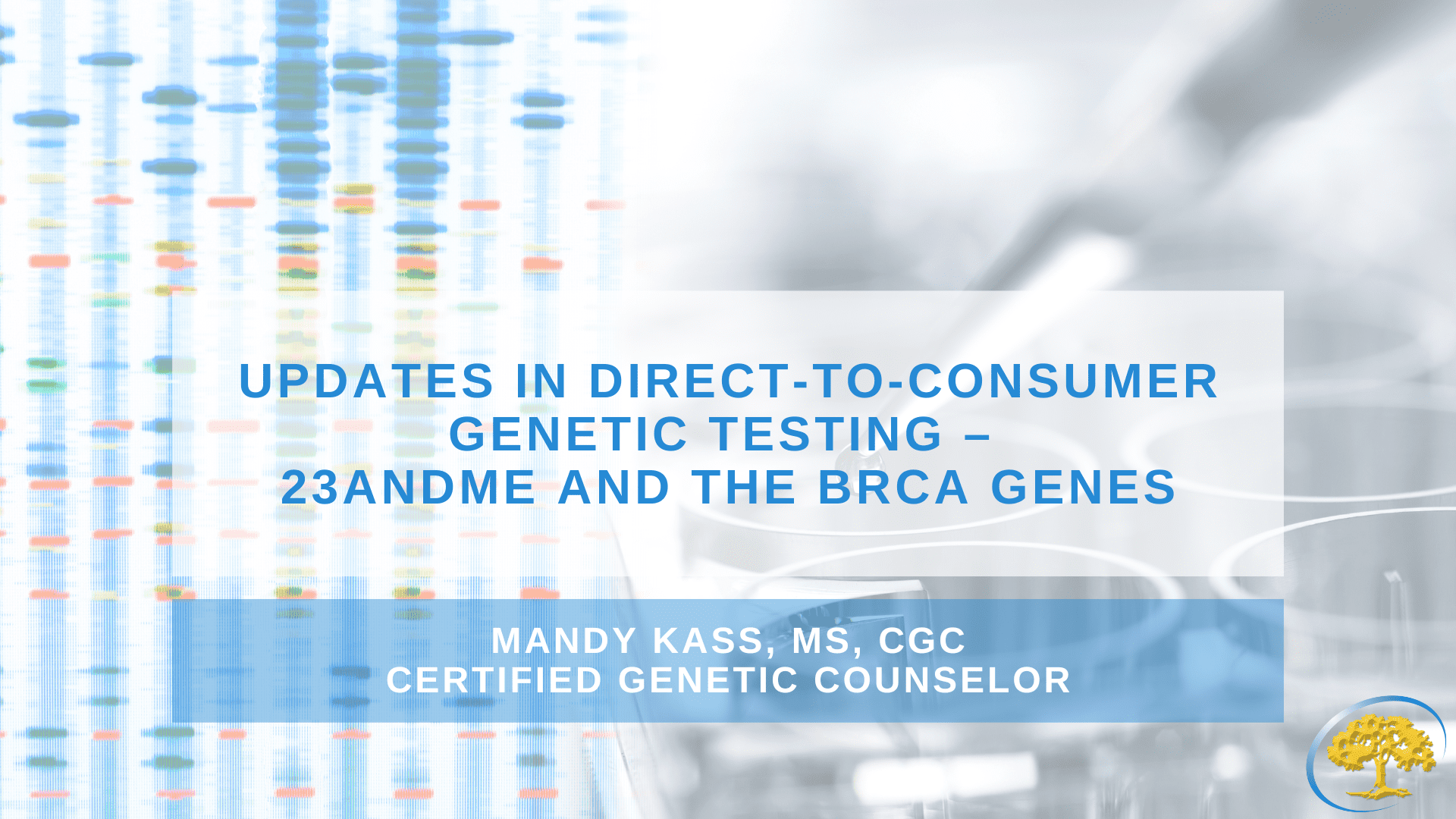
Posted 1 year ago
Updates in Direct-to-Consumer Genetic Testing – 23andMe and the BRCA Genes
The direct-to-consumer genetic testing company, 23andMe, has recently added 41 new variants to their BRCA1 and BRCA2 selected variants genetic health risk report, set to release by the end of 2024. But what does that mean for you?
BRCA1 and BRCA2 are genes that work in our bodies to help protect us from breast, ovarian, prostate, and pancreatic cancer, and melanoma in some cases. If someone is born with a pathogenic (harmful) variant within one of these two genes, they have a higher risk of developing these cancers. Knowing that you have a harmful variant in the BRCA1 or BRCA2 gene is important because it allows for the pursuit of early detection through increased surveillance as well as options for prevention. But it’s important to understand the differences between the type of BRCA testing offered through direct-to-consumer companies like 23andMe and testing that you could have done through your healthcare provider.
Previously, 23andMe was only looking for 3 variants in the BRCA1 and BRCA2 genes. Specifically, they were looking for the three most common variants seen in the Ashkenazi Jewish population. Recently, 23andMe has added 41 additional variants to their list, so in total they will now be looking at 44 variants in these two genes. Sounds like a big increase, right? Well, not quite. There are actually several thousand variants within the BRCA1 and BRCA2 genes that can cause someone to have an increased risk for cancer. So, 44 variants are still a very small piece of the pie.
What makes a medical genetic test so much better? When you have a medical genetic test done through your healthcare provider, the lab performing that test is looking through the entire gene; they’re looking for pieces of the gene that are missing or added or “spelling mistakes” within the gene that would cause it to not function properly, with the goal of detecting any of the thousands of pathogenic variants that may be present. This testing can provide a much deeper insight into the status of these BRCA1 and BRCA2 genes.
Overall, the 41 additional variants being included in this new 23andMe report do not represent the majority of BRCA1 and BRCA2 variants in people of most ethnicities. Many people who have a pathogenic variant in their BRCA1 or BRCA2 gene are not going to be detected by this update. They would, however, be detected on most medical genetic tests. Additionally, this updated report will not include variants in any other genes known to be associated with hereditary cancer risk. A medical genetic test often includes a whole panel of genes linked to cancer risk and would be able to identify a pathogenic variant if present in one of these other genes. All-in-all, this update to 23andMe testing can be useful in limited cases as it may alert some people to a pathogenic variant. However, if you’re someone who is interested in learning more about your hereditary cancer risk, a medical genetic test will always be the most comprehensive approach.
Mandy Kass, MS, CGC
Certified Genetic Counselor

The ultimate goal of cancer genetic counseling is to empower patients to use their personal risk information to better inform treatment and management decisions and to educate family members on their possible cancer risks.
Mandy obtained her Bachelor of Science degree in Psychology from Arizona State University in 2013. She then went on to pursue her Master’s Degree in Human Genetics from Sarah Lawrence College and graduated in 2016. Her training in genetic counseling included clinical rotations at several locations throughout New York City, including Columbia University Medical Center, Mount Sinai Beth Israel, and Bellevue Hospital.
Prior to pursuing her graduate degree, Mandy worked for the National Suicide Prevention Lifeline. She is also a member of the National Society of Genetic Counselors and of the Cancer Special Interest Group. Outside of work, Mandy enjoys exploring Arizona, traveling, and spending time with her family, friends, and two golden retrievers.
She is happy to be part of Ironwood Cancer & Research Centers and to manage a genetic counseling department based on individualized care, patient education, and supportive guidance.
